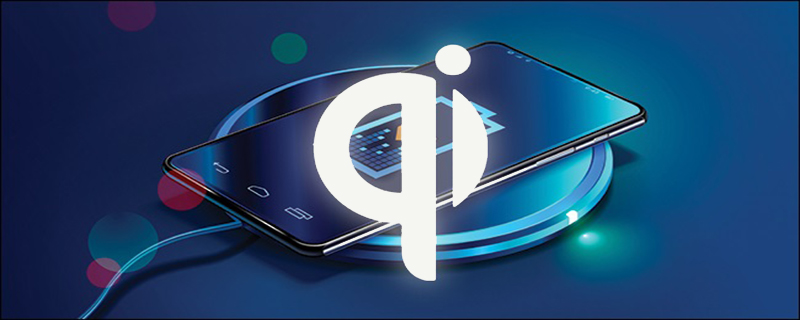What is the Qi standard wireless charger?

Qi is the "wireless charging" standard launched by the Wireless Power Consortium (hereinafter referred to as the "Consortium"), the world's first standardization organization to promote wireless charging technology. , with two major characteristics: convenience and versatility. (Recommended learning: PHPSTORM )
qi Standard has been strongly supported by more than 200 well -known enterprises including Apple, Philips and Bellkin. The goal is to provide wireless charging safely and conveniently while ensuring that all devices bearing the Qi logo are compatible with each other.
Qi (pronounced "chee") is the standard for wireless energy transfer. It is a format maintained by the Wireless Power Consortium (WPC) that aims to standardize wireless charging for all devices in the same way that the USB or Bluetooth standards standardize data transfer across all devices.
First of all, products of different brands can be charged with Qi wireless chargers as long as they have a Qi logo.
Secondly, it overcomes the technical bottleneck of "universality" of wireless charging. In the near future, mobile phones, cameras, computers and other products can be charged with Qi wireless chargers, opening up a new era of wireless charging. Large-scale applications are possible.
The icon "Qi" is the pinyin (Qi) of "Qi" in Chinese, which means "it represents "vital energy" - an invisible energy in Asian philosophy.
Qi Wireless The charging system consists of a base station and a mobile device. The base station contains one or more transmitters, which will provide energy for reception.
The mobile device contains a receiver to provide power to the load (such as a battery). The receiver will also provide information to the transmitter. There is an energy conversion unit in the transmitter that converts electrical energy into a wireless energy signal, and an energy collection unit in the receiver converts the wireless energy signal into electrical energy.
Receiver Electric energy will be delivered to the load as needed, and the transmitter adapts the energy transfer according to the needs of the receiver.
Qi transmits power based on the principle of electromagnetic induction. The basic principle of the inductive coupling power transmission system is shown in the figure on the right. This The system consists of a transmitter coil L1 and a receiver coil L2. The two coils together form an electromagnetic coupling inductor.
The alternating current carried by the transmitter coil generates a magnetic field, and causes the receiver coil to generate voltage through induction. This voltage can be used to power mobile devices or charge batteries.
The efficiency of power transfer depends on the coupling between the inductors (k) and their quality (Q). (See Figure of Merit )
Coupling is not only related to the distance between the two inductors (z) and the relative size (D2 /D), but also to the shape of the coil and the angle between them.
The Qi wireless charging system consists of a base station and a mobile device. The base station contains one or more transmitters, which will provide energy for reception.
The mobile device contains a receiver to provide power to the load (such as a battery), the receiver will also provide information to the transmitter. There is an energy conversion unit in the transmitter to convert electrical energy into wireless energy signals, and the energy collection unit in the receiver converts wireless energy signals into electrical energy.
The receiver will deliver power to the load as needed, and the transmitter adapts energy delivery according to the needs of the receiver.
The above is the detailed content of What is the Qi standard wireless charger?. For more information, please follow other related articles on the PHP Chinese website!

Hot AI Tools

Undresser.AI Undress
AI-powered app for creating realistic nude photos

AI Clothes Remover
Online AI tool for removing clothes from photos.

Undress AI Tool
Undress images for free

Clothoff.io
AI clothes remover

AI Hentai Generator
Generate AI Hentai for free.

Hot Article

Hot Tools

Notepad++7.3.1
Easy-to-use and free code editor

SublimeText3 Chinese version
Chinese version, very easy to use

Zend Studio 13.0.1
Powerful PHP integrated development environment

Dreamweaver CS6
Visual web development tools

SublimeText3 Mac version
God-level code editing software (SublimeText3)

Hot Topics
 1377
1377
 52
52


